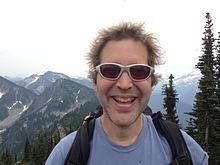Fields Computational biology Name David Baker | Role Biochemist | |
 | ||
Born October 6, 1962 (age 63) ( 1962-10-06 ) Institutions University of WashingtonHoward Hughes Medical Institute Alma mater University of California, BerkeleyUniversity of California, San Francisco Notable awards Beckman Young Investigators AwardOverton PrizeFeynman Prize in Nanotechnology Education University of California, Berkeley (1989), Harvard University (1984), University of California, San Francisco Similar People Randy Schekman, Andrej Sali, David Agard, James Rothman, Eric Klavins | ||
Antibody engineering 2013 david baker ph d professor of biochemistry university of washington
David Baker (born October 6, 1962 in Seattle, Washington) is an American biochemist and computational biologist who has pioneered methods to predict and design the three-dimensional structures of proteins. He is a Professor of Biochemistry at the University of Washington (UW), where he is the principal investigator of the 80+ member Baker laboratory. He serves as the Director and Safety Officer of the Rosetta Commons, a consortium of labs and researchers that develop biomolecular structure prediction and design software. He is a Howard Hughes Medical Institute investigator and a member of the United States National Academy of Sciences.
Contents
- Antibody engineering 2013 david baker ph d professor of biochemistry university of washington
- David baker u washington hhmi part 1 introduction to protein design
- Life
- References
David baker u washington hhmi part 1 introduction to protein design
Life
The Baker laboratory developed the Rosetta algorithm for ab initio protein structure prediction, which has been extended to a distributed computing project called Rosetta@Home and Foldit. The project aims to produce structural models for protein complexes as well as individual polypeptide chains. The Baker group participates regularly and is recognized for expertise in the CASP structure prediction experiment using ab initio methods, including both manually assisted and automated variants of the Rosetta protocol.
Members of the Baker group are also active in the field of protein design; they are recognized as the first group to have designed a protein, known as Top7, with an entirely novel fold.
Baker did his graduate work in biochemistry at the University of California, Berkeley in the laboratory of Randy Schekman, where he worked predominantly on protein transport and trafficking in yeast. He did his postdoctoral work with David Agard of University of California, San Francisco.
Although well known for development of methods for computational prediction of protein structure and function, Baker is focused on the use of computational methods to drive experimental assessment of biology and therefore the Baker laboratory maintains an active experimental biochemistry group.
For his work on protein folding, Baker received the 2008 Sackler International Prize in Biophysics. Baker was elected a Fellow of the American Academy of Arts and Sciences in 2009. He is married to Hannele Ruohola-Baker, another biochemist at UW. They have two college-age children.
